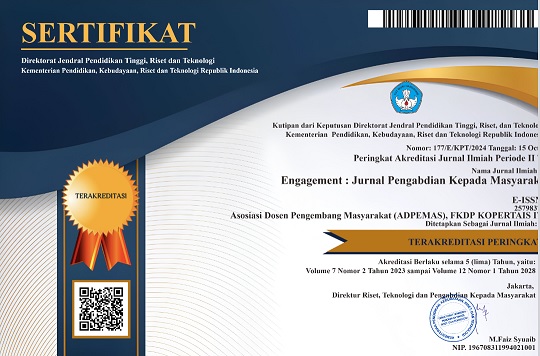Improving STEM Capability of Islamic Boarding School Students in Batam Through Robotics Training
Abstract
Conducting robotics training as a community service to improve basic knowledge of Science, Technology, Engineering, and Mathematics (STEM) for students is one of the ways to improve their basic knowledge of Science, Technology, Engineering, and Mathematics (STEM) for students is one of the most important aspects of the facing the industrial era 4.0 and society 5.0. Through the Service-Learning approach, this community service by collaborating with Granada International in Batam by involving 29 students, consisting of 7 students from class X, 15 students from class XI, and the rest from class XII, class XI students, and the rest from class XII. The results of mentoring through robotics training were able to increase the average STEM skills of students by 38.15%. In addition, the activity was successfully implemented with participant satisfaction levels above 50% for the subject matter, instructor, and training equipment. Only 17% of the trainees stated that the training time was insufficient, especially for practicum.
Downloads
References
Bates, Daniel G, Geoff Wright, and Steven Shumway. “An Investigation of the Impact an ROV Competition Curriculum Has on Student Interest in STEM, Specifically Technology and Engineering” (n.d.).
ChanJin Chung, C J, Christopher Cartwright, and Matthew Cole. “Assessing the Impact of an Autonomous Robotics Competition for STEM Education.” Journal of STEM Education: Innovations & Research 15, no. 2 (2014): 24–34.
Farwati, Ratna, Kartika Metafisika, Indah Sari, Debora Suryani Sitinjak, Dian Farkhatus Solikha, and Solfarina Solfarina. “STEM Education Implementation in Indonesia: A Scoping Review.” International Journal of STEM Education for Sustainability 1, no. 1 (July 2021): 11–32.
Goh, Henry, and Mohamad B B Ali. “Robotics as a Tool to Stem Learning.” International Journal for Innovation Education and Research (2014).
Hafni, R N, T Herman, E Nurlaelah, and L Mustikasari. “The Importance of Science, Technology, Engineering, and Mathematics (STEM) Education to Enhance Students’ Critical Thinking Skill in Facing the Industry 4.0.” Journal of Physics: Conference Series 1521, no. 4 (March 2020): 042040.
Jiang, Liangfu, and Hua Yuan. “Stable Parallel Algorithms for Interdisciplinary Computer-Based Online Education With Real Problem Scenarios for STEM Education.” Complexity (2021).
Nata, I Putu Raka, I Wayan Yasana, Kadek Aldi Setiawan, Si Gede Dandi Yudha Sutamara, Gede Sandita Widiada, and Ida Bagus Putu Mardana. “Smart Project Educational Robot (SpaceR) Sebagai Robot Edukasi.” Jurnal Aplikasi dan Inovasi Iptek (JASINTEK) 3, no. 1 (October 2021): 56–64.
Nugent, Gwen, Bradley S Barker, Neal Grandgenett, and Greg W Welch. “Robotics Camps, Clubs, and Competitions: Results From a US Robotics Project.” Robotics and Autonomous Systems (2016).
Nugroho, O. F., A. Permanasari, and H. Firman. “The Movement of STEM Education in Indonesia: Science Teachers’ Perspectives.” Jurnal Pendidikan IPA Indonesia 8, no. 3 (September 2019): 417–425.
Permanasari, Anna, Bibin Rubini, and Oktian Fajar Nugroho. “STEM Education in Indonesia: Science Teachers’ and Students’ Perspectives.” Journal of Innovation in Educational and Cultural Research 2, no. 1 (June 2021): 7–16.
Ponce, Pedro, Christian Fernando López-Orozco, Germán E Baltazar Reyes, Edgar Lopez-Caudana, Nancy Mazon Parra, and Arturo Molina. “Use of Robotic Platforms as a Tool to Support STEM and Physical Education in Developed Countries: A Descriptive Analysis.” Sensors (Basel, Switzerland) 22, no. 3 (January 2022): 1037.
Prayogo, Sandy Suryo, Yogi Permadi, and Tubagus Maulana Kusuma. “RANCANG BANGUN AGROBOT-II: ROBOT EDUKASI PENANAM BENIH TANAMAN PADI DENGAN KENDALI JARAK JAUH.” Jurnal Ilmiah Teknologi dan Rekayasa 25, no. 2 (August 2020): 89–101.
Rahman, S M M, Veena J Krishnan, and Vikram Kapila. “Fundamental: Optimizing a Teacher Professional Development Program for Teaching STEM With Robotics Through Design-Based Research” (n.d.).
Sartika, Dewi. “PENTINGNYA PENDIDIKAN BERBASIS STEM DALAM KURIKULUM 2013.” JISIP (Jurnal Ilmu Sosial dan Pendidikan) 3, no. 3 (November 2019): 89–93.
Copyright (c) 2023 Engagement: Jurnal Pengabdian Kepada Masyarakat

This work is licensed under a Creative Commons Attribution-ShareAlike 4.0 International License.







_-_Copy1.jpg)
